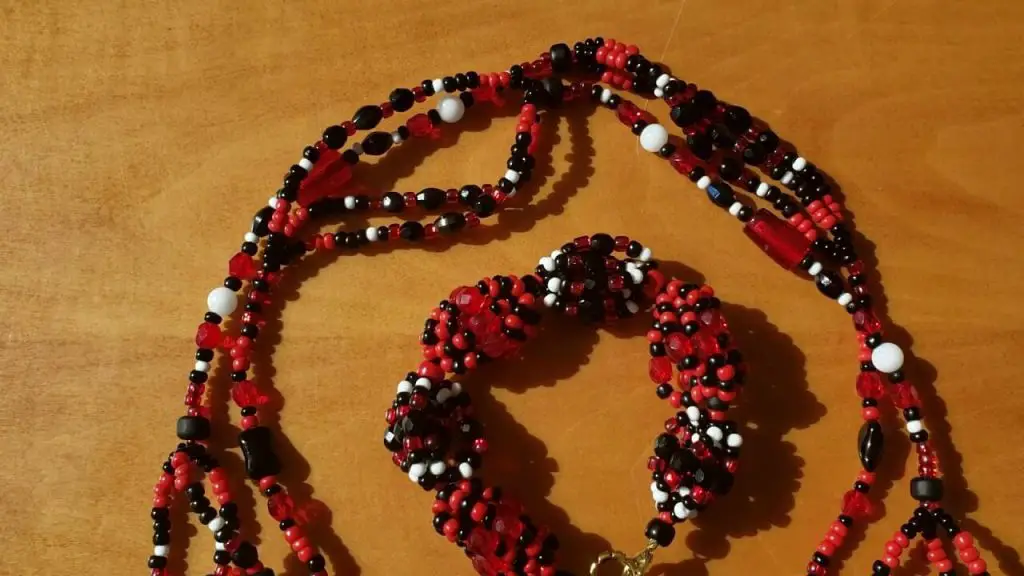Like most religions, there is a set of guidelines that Santeria practitioners should observe.
Only those who meet the requirements of the Santeria religion benefit from its spiritual practices.
Some of the eleke rules, which vary across Santeria communities, include not sharing the necklaces with another person, not taking drugs or alcohol while wearing them, and removing elekes when swimming or bathing.
The consecrated necklaces are believed to offer a range of benefits to the wearers, such as financial prosperity, good health, protection from illnesses, etc.
That said, one of the questions most people ask regarding elekes, the bracelets or necklaces worn by Santeria practitioners, is if anyone can wear them.
Well, the short answer is: Everyone is eligible to wear elekes, but only after they undergo the religion’s initiation. Wearing elekes without guidance and the go-ahead from respective religious leaders is deemed disrespectful.
The tradition requires interested practitioners to undergo an initiation ceremony presided by a godfather or godmother, where the necklaces or bracelets representing the five primary Santeria deities (Obatala, Yemaya, Oshun, Eleggua, and Shango) are handed to the initiated after consecration.
Requirements for Wearing Elekes

If you would like to become part of the Afro-Caribbean tradition, you must meet the following requirements:
1. Initiation
Wearing elekes, as discussed above, only applies to those willing to undergo an initiation ritual presided over by a religious leader.
The initiation is a sacred introduction of the practitioner to a specific deity or Orisha.
Some of the activities done during initiation include cleansing the practitioner, choosing Orisha, consecrating eleke, celebrating the initiation with food, dancing, etc.
2. Commitment
Like any other religion, Santeria or Lukumi traditions expect believers to honour its practice without fail, such as teachings, rituals, offerings, etc.
Practitioners are also advised to respect the tradition by adhering to rules such as not undressing in the presence of elekes.
Several other moral standards are to be observed, such as not cursing while wearing the elekes or during menstruation.
3. Guidance and readiness
The decision to wear elekes should be carefully thought through and not rushed for the sake of fitting in.
Interested individuals should be guided through the religion’s practices by experienced practitioners or leaders, who will assess their readiness before planning an initiation ceremony.
4. Proper Care
You should be ready to take care of your elekes for them to serve you longer.
Store them in a clean white handkerchief or clothing when not wearing them.
Also, avoid dropping them on the ground anyhow.
Also check: How to Feed Elekes
Is It Possible to Wear Elekes From Multiple Spiritual Traditions?
Given the several benefits associated with elekes, it is common for practitioners to want to know if they can wear elekes from multiple spiritual traditions.
Several elekes represent different deities, but practitioners are advised to wear and adhere to a specific elekes tradition.
It is easier to deal with a specific elekes than to manage multiple because of the commitment required.
Those interested in wearing elekes from several traditions should take time to learn the beliefs associated with each practice and only settle on a tradition that aligns with their spiritual needs.
Mixing different Santeria religious traditions is strongly discouraged because you may mix up the practices due to confusion and failure to achieve any goals.
Things to Avoid When Wearing Elekes

Wearing elekes has its dos and don’ts.
The dos include periodical cleansing and taking care of them to avoid wear and tear.
What of the donts? Are there practices that one should avoid when wearing elekes?
Sure, here is a list:
I. Mixing practices
Santeria traditions vary across different religious setups. For this reason, one should commit to a specific tradition and avoid mixing up.
Believers should only commit to a single tradition, and overindulgence is deemed disrespectful.
II. Displaying elekes publicly:
Elekes are not only spiritual objects but should also be private, meaning they should be kept away from public wear.
Ensure they’re covered under your clothes and invisible to others you.
III. Sharing
Elekes belong to their owners only and should not be shared. Forget about sharing; other people: be they friends, colleagues, or relatives, should not touch your elekes.
If you share or allow other people to touch your elekes, they may disrupt your spiritual connection with the necklaces by transferring negative energies, rendering them weak.
Learn more here: What to do if someone Touches Your Elekes
IV. Neglecting Elekes
The necklaces need routine maintenance to keep them functional.
You should not receive elekes if you are not ready to care for them because you will disrespect the religion and the spiritual realm.
Elekes items are prone to wear and tear if not well maintained.
Also, cleanse them frequently using purified water to maintain their spiritual power.
V. Wearing Elekes that haven’t been consecrated
Elekes are different from ordinary necklaces used for ornamental purposes.
They are sacred items that should be worn by Santeria religion believers.
Therefore, you should not wear unconsecrated elekes because it disrespects the tradition and they have no connection to the deities.
You should undergo the initiation first for eligibility to wear elekes.
You may also want to check:

